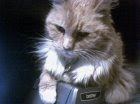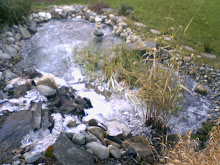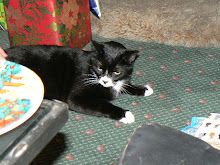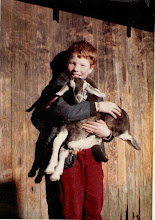Sunday, December 30, 2007
Wiki'd
Meanwhile, please check out the results of my fiddling by taking a peak at Collection Management's new Reader's Advisory Wiki. You will find there a featured review by non-fiction selector Gail Goodrick, links to blogs by KRL selectors, links to reviews, some really cool book sites, and more. Now, before you say nay to our site or to anything you find or don't find on it, I hope you will remember we are just getting this going. This is our first stab at this and as such, fully in the true nature of the Wiki concept, is a work in progress. We still have much to fix, add (such as tags), and do. Also, our capacity to have anyone change or add to the Wiki is limited right now, but we are working on it. For now, if there is anything you think we should post or add to this Wiki, please contact the Wiki administrator—oh hey, right now that's me. So e-mail me, reply to this post, or be truly wiki'd and scroll down the Wiki's front page and click on Contact Wiki Owner under the Wiki Information tab.
Still wondering "Why Wiki?" Here are a few books to peak discussion. You may not agree with everything you read in them. You may not even finish them, choosing instead to pick around in them like an after-holiday turkey. (I confess that's what I did.) Whatever your reading method, I guarantee these books will raise some questions and maybe even provide a few answers.
Wikinomics, by Don Tapscott. Can well-made Wikis impact business significantly by reducing things like email and meeting time by 50 to 75 percent? Whether it's accurate or not, this book is food for thought and definitely a window into the direction the world is taking. You may not agree with Tapscott style or his conclusions, but to ignore this phenomenon is to be left behind.
The Wisdom of Crowds, by James Surowiecki. Under the right circumstances, are groups really smarter than the smartest people in them? Read Surowiecki's 2004 study on what it takes to make a "wise crowd"—and, believe me, it isn't just everybody gets input; there needs to be, among other things, a method for aggregating all those ideas—and see if you agree with his conclusions.
Thursday, December 20, 2007
All through the house

 If you started with this blog at the beginning, you will recall that Megzilla is my mother's cat and the inspiration for this blog. Why? Because she's a thinker, and I'm pretty sure she surfs the net at night to come up with ways to move hefty household objects to new and perplexing locations during the night.
If you started with this blog at the beginning, you will recall that Megzilla is my mother's cat and the inspiration for this blog. Why? Because she's a thinker, and I'm pretty sure she surfs the net at night to come up with ways to move hefty household objects to new and perplexing locations during the night.
Since Meg is the muse behind the blog, I thought I should regale you with a few of Meg's favorite reads for the holiday season. As may be apparent, I consider these Meg's favorites not because I have the least idea what goes on behind Meggy's gimlet gaze; indeed, I wish I knew. I imagine these are her favorites because they remind me of her, and also, frankly, because they are quite wonderful, both in concept and story and in the realization of vivid language through thoughtful illustration. Whether you have children at home or are simply young-at-heart, I urge you to take a look at these holiday classics, both penned by widely beloved authors. I am sure Megzilla loves them. After all, she is smart.
A Pussycat's Christmas, by Margaret Wise Brown. Illustrated by Anne Mortimer. Melodic language brings the sights, sounds, and smells of the season to life, as one black-and-white cat (a Megzilla look-alike) watches her family prepare for Christmas. Cat-lovers will enjoy Pussycat's encounter with tissue, tinsel, Christmas stockings and snow; readers everywhere will love the magical prose and jewel-like illustations that capture the juxtaposed excitement and stillness of Christmas. Brown is the author of Goodnight Moon and countless other children's classics.
The Christmas Day Kitten, by James Herriot. Illustrated by Ruth Brown. Anyone who has ever taken in and loved a stray, will be warmed by Herriot's story of stray tabby Debbie, who one Christmas morning brings her kitten to the "only place of comfort and warmth she had ever known" in plumpish Mrs. Pickering's farmhouse. Sadly, Debbie is dying, but the kitten grows to be a most remarkable and well-loved cat--a true Christmas miracle. Ruth Brown's illustrations perfectly capture the warmth and love of a Yorkshire country Christmas.
Illustration (above) from A Pussycat's Christmas
Wednesday, December 19, 2007
Sorry, No Luddites Here
Collection Management Gets Down, Gets Wiki
I would like to dispel an unfortunate rumor that this library’s Collection Management Department houses any individuals with Luddite tendencies. We are actually all computer literate (we have to be for our jobs), and many of us blog, have RSS feeds and del.icio.us accounts, and use (and love) LibraryThing. That is in addition to the computer and Web-intensive work we do every day.
Our department is in the process of putting together ideas and material for a Collection Management Wiki, which we will begin posting next week. (Sorry it can be no sooner, but we also have lives outside the library.) The focus of our department’s Wiki will be Reader’s Advisory. We are all readers, and, as you know, many in our department are Librarians and selectors, while others have advanced degrees in literature. However, educational level and titles aside, as our Library Training Day speaker reminded us, ANYONE in the library can do Reader’s Advisory, and all of us are ready and eager to share. Here are a few of the features we hope to include on our Wiki:
- Featured reviews
- Links to book-related blogs (internal and external)
- Book group information
- Publishers Weekly 5 star reviews and other industry review information
- Genre lists and reviews
- DVD and other media lists and review information
Please note that, while the comments of this blog reflect only the opinions and tone of the blogger, we are all excited about this. As one of our team put it, “This is what libraries should do. It's a great service to patrons and it markets our collection. In short, it adds value.”
Those contributing content and discussion on the CM Wiki include, in egalitarian alphabetical order: Martha Bayley, Kelli Becker, John Fossett, Gail Goodrick, Tish Hodge, Michelle Mason, Constance O’Shea, Lisa Schureman, Lisa Tyler, and Lael Voeller.
Thursday, December 13, 2007
All Over the World
My husband breaths quietly beside me, and the only other sound is the quiet suserration of an ocean sounds CD by my husband’s pillow. Outside, a glimpse of Christmas Town beckons from across the cul-de-sac, where our neighbors, both Wal-Mart employees, have installed every purchasable holiday fantasia in an ongoing spirit of keeping American consumerism and the feng shui of Snoopy’s doghouse alive. And yet, at this hour and across this distance, the 8-foot blow-up snowmen and tinsel-bedecked caravan of shimmering packages look both fantastical and somehow even lovely amid their twinkle of festive lights.
In spite of the unlikeliness of the hour, my brain has decided I’m done sleeping for the night. Might as well get up and read in the pre-dawn stillness. Today, I am finishing About a Boy, in order to fulfill a request for holiday theme reviews and secure my rights, per Hannah's DVD blog, to the Good Ol' Virginia Killer Egg Nog recipe. Thanks to Hannah’s eloquence, I am sure THE recipe will change my life, or at least significantly alter a worthwhile percentage of holiday evenings, so here goes.
Professional rebound-guy and incurable fantasist Will Freeman has made a career of avoiding committed relationships. (“We always thought you had hidden depths,” his friends say. “No,” says Will. “I really am this shallow.”) To facilitate his quest to meet attractive but lonely ladies, Will invents a two-year-old son and joins a group called SPAT (Single Parents Alone Together). “Children democratize beautiful single women,” Will theorizes, thereby making them more likely to date do-nothings like himself. But instead of the blissful series of brief but uplifting encounters he imagines springing from his new parental persona—curiously, Will sees his half-truths and fantasies as a harmless way to meet and provide interim solace to jaded women on their way to their next real relationship—Will finds himself making an unlikely friend of 12-year-old uber-geek Marcus. As the consequences of Will’s fictionalized fatherhood begins to catch up with him (note, concepts like cause-and-effect and speculation beyond tomorrow’s lunch do not appear among Will’s strengths), Will finds he has as much to learn from Marcus about family, honesty, and caring as Marcus has to learn from him about being cool.
Iffy and potentially clichéd as the above scenario may sound, About a Boy has a certain charm. Yes, Will embodies an extreme version of the oft-cited male capacity for avoiding any discussion around or expression of ucky relationship stuff. Still, as in his earlier novel High Fidelity, author Nick Hornby has a knack for capturing the quirks and foibles of modern mid-‘90s relationships, both those that are a product of, in ‘90s lingo, the Mars/Venus rift, and those arising from a second generation of “hippie” idealists at odds with a self-avowed Me generation, and making them feel deeply personal. (The scenes, for example, where Will begins to feel at home at Marcus’ family’s geeky Christmas gathering are priceless.*) In spite of—perhaps because of— flaws, his characters are understandable, even unlikable: even when they mess up royally, we can’t help but root for them.
On the other side of the afore-mentioned Mars/Venus rift, Helen Fielding’s novel Bridget Jones’s Diary spans a single year, from Christmas to Christmas, in the life of 30-something “singleton” Bridget Jones on her permanent quest to both form a functional f***wittage-free relationship and lose 20 pounds. As good a revisionist version of Jane Austen as I’ve seen, Bridget Jones is uninhibited, laugh-out-loud funny, and a rockin’ good retelling of Pride and Prejudice with modern twists throughout. The generation of women who love the BBC Pride and Prejudice with Colin Firth will find much to relate to in this feel-good holiday read, including (you guessed it) a hero named Darcy, a silly, flighty mum in the spirit of Mrs. Bennett and Lydia rolled into one, plenty of social satire, and a healthy post-modern touch of self-reflexive humor, since Bridget herself is a fan of the BBC’s Firth-fest. “It struck me as being pretty ridiculous to be called Mr. Darcy and to stand on your own looking snooty at a party,” Jones muses on meeting her Mr. Darcy. “It’s like being called Heathcliff and insisting on spending the entire evening in the garden shouting ‘Cathy’ and banging your head on a tree.”
One word of advice on Bridget Jones, though. Don’t read this book if you are on a serious diet. Not only will Bridget’s occasional (justified, of course) 4,000 calorie binge days make you feel okay about breaking your diet, you will find yourself possessed of an undeniable soul-searching emptiness that can only be filled by chocolate croissants.
So, Hannah, what do you say? Enough to make you hand over the recipe? It’s nearly the New Year, and there’s partying to be had! Just don't forget you are always invited.
**Watching the film version of About a Boy, my husband—NOT, I should point out, a geek—was particularly struck by the holiday party scenes with Marcus' geek family. "I can relate," he remarked drily... but also fondly. We geeks are a pleasant lot, after all.
Wednesday, December 5, 2007
8-Ball's Cabin Fever
 Just as I was beginning to really groove on the idea of having a moat around the ol’ castle, the waters receded and we are once again able to venture out into the yard—that is, if we don’t mind sinking an inch or six. With this newfound freedom after five long days of being first snow- and then monsoon-bound, 8-ball—whom you may remember from my previous post as our resident Boston Terrier-in-cat’s-clothing—immediately ventured forth in spite of a lifelong fear of alligators, bog critters, unfamiliar noises, and people he doesn’t know, only to return posthaste to leave muddy cat-prints all over the hall, dining room, bedroom, kitchen, and foyer. Ah, the joys of pet "ownership."
Just as I was beginning to really groove on the idea of having a moat around the ol’ castle, the waters receded and we are once again able to venture out into the yard—that is, if we don’t mind sinking an inch or six. With this newfound freedom after five long days of being first snow- and then monsoon-bound, 8-ball—whom you may remember from my previous post as our resident Boston Terrier-in-cat’s-clothing—immediately ventured forth in spite of a lifelong fear of alligators, bog critters, unfamiliar noises, and people he doesn’t know, only to return posthaste to leave muddy cat-prints all over the hall, dining room, bedroom, kitchen, and foyer. Ah, the joys of pet "ownership."8-ball’s speedy retreat to the comforts of hearth and home belies a tortuous five days of feline cabin fever, spent first gazing in rapt fascination at snowflakes the size of golf balls, later shifting his stare accusingly from the sheeting rain to the ineffectual human denizens of the household who proved inexplicably errant in halting the deluge, and finally scampering hurriedly to the nearest lap at the first sound of knees creaking into a seated posture. During this time, 8-ball ventured out only once, and then only to determine once and for all that snow is (a) wet, (b) cold, and (c) kinda scary.
The bulk of his weather-bound captivity (when not staring pointedly at the catnip box, jumping on the kitchen counter for attention, or biting his brother Magic's neck—also for attention—and hanging on like a very determined rat terrier with a really juicy rat*) was spent rolling playfully, all four legs akimbo, on whatever either my husband or I happened to be reading/doing at the time. (It should be noted that in spite of a considerable amount of time spent strolling across computer keyboards, 8-ball has proven completely incapable of randomly producing Hamlet.) With so much time spent around books, newspapers, and computers, though, it’s only natural that 8-ball picked up a few favorites:
Three Stories to Read to Your Cat and Three Stories to Read to Your Dog. The beauty of these wonderful little volumes by Sara Swan Miller is their inherent cattiness and dogginess. If cats and dogs could write stories, this is what they’d write. (8-ball’s rating: 5 stars for subject matter that appeals to cats.)
Walter, the Farting Dog. OK, it’s not exactly Finnegan’s Wake, but James Joyce might well approve of William Kotzwinkle’s tale of a gas-plagued pooch (not to mention its numerous scatological sequels) with surreal illustrations by Audrey Coleman, focusing largely on the gust of wind from Walter’s backside. Rest assured anyone under the age of five will be laughing out loud. (8-ball’s rating: 5 stars for accurate depiction of people’s extreme over-reaction to dropping a harmless biscuit or two. Constance's rating: Er...)
Magic Thinks Big, by Elisha Cooper. A testament to the power of imagination, solid and contemplative tabby Magic debates whether to go outside or stay indoors in this charmingly illustrated tale of the meditative power of cats. (8-ball’s rating: 4 stars for providing a potentially viable wishlist of “42 Things [8-ball] Might Want to Do This Year.” Minus 1 star for naming the cat Magic, instead of 8-ball. See earlier comments on Magic.)
Desser, the Best Ever Cat, by Maggie Smith. OK, maybe it’s not 8-ball’s favorite, but it is mine. An invitingly-illustrated tribute to the lifelong friendships between people and pets, Smith’s tale recounts the joy of growing up with a beloved pet. On a more solemn note, it also provides a thoughtful handling of the grief that accompanies that pet’s loss in old age. A thoughtful and reassuring story for children (or adults) coping with grief, Desser serves as a wonderful reminder of the unconditional love and companionship pets bring us throughout our lives. (8-ball’s rating: 5 stars because Desser looks like 8-ball and is the center of attention, which is as it should be. Constance’s rating: Desser, the Best EVER Cat Book.) .
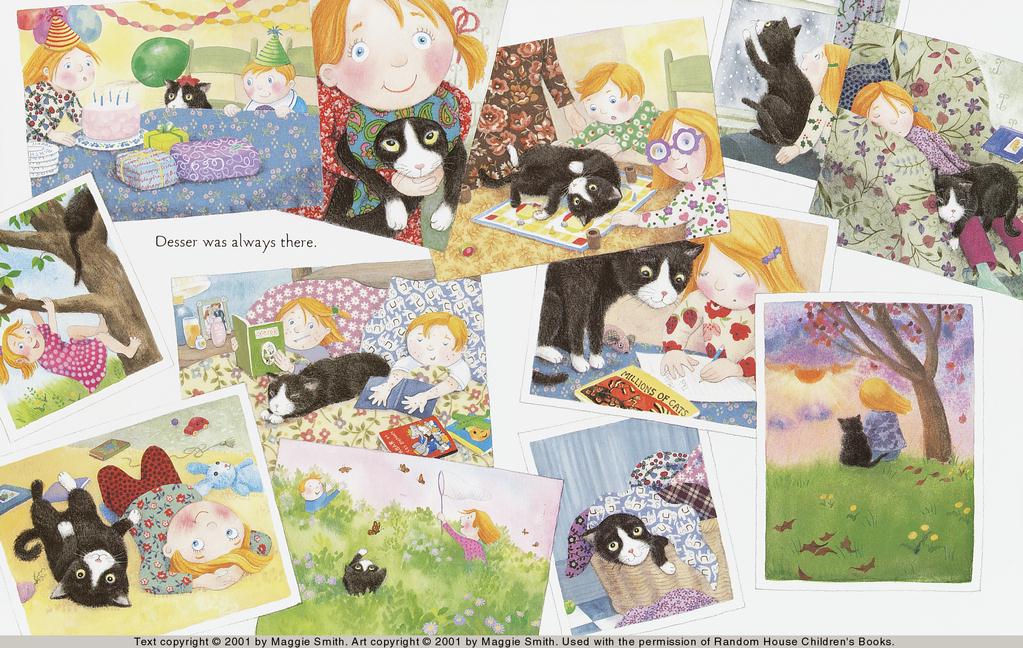
The essense of cat nature: Illustration page from Desser, the Best Ever Cat
*Magic, being larger, solider, and more lethargic, generally ignores such vampire-inspired tactics, preferring instead to wait with Gandhi-like patientce for someone to come pry 8-ball off. Many are the mornings I emerge from the shower to find 8-Ball and Magic locked in tableaux.
Monday, December 3, 2007
Welcome to the Bog
As torrential rainfall has sent library staff and patrons home early and turned my usually pleasant backyard into a fascinatingly squelchy bogland from which I expect at any moment to see water moccasins and alligators rise, I simply haven't the heart to write about any subject more watery than a large blended and therefore water-(in the form of ice, that is)-filled margarita. Wish I had one, but I don't.
Hence, the lack of promised desert island books, and instead a brief exploration and exceptionally-limited bit of commentary on YouTube (which I must say rather let me down on good bog videos). In short, I am not a big fan of this particular time-sucking vaccuum, but more power to its users and viewers if they are indeed bringing about social and political change with a medium that barrages its fan base with dozens (hundreds?) of untalented, uninteresting, and frequently irrelevant video entries for every search. Yeesh, my attention span is too short for this! Maybe I am a product of the MTV generation, but I can't sit through even one minute of most of these five to eight minute pieces. I have better things to do.
That said, I fully acknowledge that YouTube has created some media stars, sometimes even because said individuals are talented or actually have something important to share with the world. Happily, many, many clips are short, to-the-point, and even dare-I-say funny, and therefore of some value that apparently-humorless individuals like myself don't truly understand or appreciate (seemingly at least, given my impassioned anti-tube rant of mere moments ago).
However, to prove my point on the laugh quotient and show that I do indeed have a sense of humor, I invite you to enjoy a brief YouTube video that embodies my husband's usual morning wake-up call using the all-natural feline alarm clock. I am happy to report this is not my regular wake-up experience, as I rise before the drama begins, and besides our cats know such guerrilla tactics don't work on someone who sleeps with a special pillow for putting over her head at moments like these.
More of a dog person? The following video has made me rethink my belief that my husband and I should get a Boston Terrier as an attractively well-matched companion for our cat 8-ball:
On a related side note, I am more than half convinced that 8-ball is a rather poorly disguised Boston Terrier. (For more pictures of 8-ball at work and play, check out my side bar.)
As final proof that I put some time into this assignment, I offer the following tidbits on Kitsap Regional Library's infamous salmon video by commending the creative use of Jaws music in the soundtrack and Rory's very fine preference of Classic over other forms of Coke.
Sunday, November 25, 2007
LibraryThing! You Make My Heart Sing
Yes, there it is, folks, that’s this week’s limpid segue into the realms of krl2pt0.
I am not going to sing the praises of the many beguiling applications unique to LibraryThing. I’ll let you discover whatever particular charms it may have for you through your own explorations. I will, however, because I am not a totally mean person, tell you of its potential and immediate lures for the likes of moi. If, like me, you are one of those people who checks out more library books than you actually have time to read, you may find a parallel allure in the world of LibraryThing.
LibraryThing strikes me as uniquely suited to making long lists of books and grouping them with simple (and easily edited) tags that alert you as to why you placed those particular books on your list in the first place. For me, this appeal is primarily in the realm of “books I’d like to read” which usually aggregate in randomly penned notes in betwixt calendar pages, on the backs of bookmarks, and scattered throughout the pages of my journal. If these hastily scrawled notes (or at least the books they represent) do not make it into my library holds (all of which subsequently—and annoyingly—arrive at the same time), the papers themselves are usually lost to the winds of time, sometimes with the precise authors and titles irretrievably and tantalizingly mired in the specially fossilizing information tarpits of my mind, never to be seen or clearly remembered again.
LibraryThing offers an alternative that actually betters the Amazon wishlist by allowing you to tag your booklist with descriptors that you can easily change as books move from wishlist status to read, and then voila! You have that list of books you’ve read that we in the library world are so often encouraged to keep. Following that, you can post reviews, join discussion groups, peruse readers’ reviews, and even get suggestions based on what you’ve tagged and purportedly enjoyed. Not too different in some ways from Amazon (or from its movie equivalent Netflix), only without the sales impetus and the industry reviews, and with a more dynamic social networking aspect. No fear, though, the LibraryThing site links to the Library of Congress and to Amazon, so if you want to go to Amazon and dredge up industry reviews, you can.
On a final note, LibraryThing offers a great tool for library or readers advisory bloggers, the ubiquitous LibraryThing widget. The widget allows you to REALLY EASILY (praise the krl2pt0 powers-that-be for finally giving me an assignment I could actually, as opposed to theoretically, do in half an hour, not counting the blog time) add a link on your blog site to any grouping of books on your booklist, based on tags, random selection, or recent additions to your LibraryThing queue.
That said, slide your eyes up a notch and you will see two book jackets and one audiobook cover (all with a desert island theme) with links powered by LibraryThing widgetry. This particular selection is inspired by KRL media buyer John Fossett’s blog on that classic game of Desert Island Discs and serves as a lead in to my next blog entry, in which I will dish up my own literary take on the subject. Until then, I fully expect you to be thinking of what books you’d want to have along if you were stranded on a desert island. I mean it. I want to hear from you.
Wednesday, November 21, 2007
Literary Feasts: Words to be Thankful for
Until I feared I would lose it, I never loved to read. One does not love breathing. ~Harper Lee
We can only be said to be alive in those moments when our hearts are conscious of our treasures. ~Thornton Wilder
On the eve of this most American of holidays, I invite you to enjoy one of our most American of writers laureate, Louisa May Alcott, with her funny and festive holiday tale, An Old-Fashioned Thanksgiving, presented in its entirety at this link. An Old-Fashioned Thanksgiving is story of the seven Bassett children's adventures, peccadillos, and final heart-warming "success" (the success may be a bit qualified in terms of actual flavor) in preparing the family's Thanksgiving meal, after Mom and Dad head out to nurse their ailing Grandmother. Whether shared before or after your holiday's more bountiful festivities, this engaging country story makes a perfect family read.

Thanksgiving Day, a function which originated in New England two or three centuries ago when those people recognized that they really had something to be thankful for - annually, not oftener - if they had succeeded in exterminating their neighbors, the Indians, during the previous twelve months instead of getting exterminated by their neighbors, the Indians. Thanksgiving Day became a habit, for the reason that in the course of time, as the years drifted on, it was perceived that the exterminating had ceased to be mutual and was all on the white man's side, consequently on the Lord's side; hence it was proper to thank the Lord for it and extend the usual annual compliments. ~Mark Twain
Monday, November 19, 2007
The return of Megzilla
It's been a busy week, getting ready for Thanksgiving, and a long time since we've heard from Megzilla. Given that, I thought I'd share something that always makes me thankful: Megzilla and her adorable litter mates, Sigma, Rho, and Psi (the three "siameses"), and angelic tabby Delta Pi. You just don't get cuter than that. Enjoy the slideshow.
Please check out my updated November 9 blog entry, as well. There, you will find another slide show (a lot less cute, let me tell you now) and a picture of my husband with a goat. That's right. A goat. Come on, you know you'll have to look now.
Friday, November 9, 2007
Flickr... or Fade?

What do you think happens to archived blogs? Do they float out there in cyberspace forever--just waiting for future generations of archeologists and genealogists to crack them open and begin exploring the brightly colored contents of our forgotten lives like so many Easter eggs?
P.S. In case you are wondering about the photo of the young man with the goat that heads up this blog entry, in the spirit of keeping alive the legacy at least of Cornelius O'Shea, that is my husband at about age 10 with his goat Sundance. As long as I was on the subject of photos—lost in the void of cyberspace or otherwise—I thought I would throw this one to the winds of posterity, and see what happened. No special reason. I just like this photo and have no other venue for sharing it. I should add that I always knew if I ever got married I would marry a man who loved animals. And I did. If you are really a sucker for romantic stories, ask me about me about that one some day. For now, I invite you to view photos of our wedding day on Flickr. Please be kind and bear in mind we went from work to wedding that day. No time to have my hair done and all that frilly stuff: Wedding of the century—NOT
Friday, November 2, 2007
Invasion of the Podcasters
Heh, heh. Just kidding. That was kind of mean of me, wasn’t it?
In this day and age, with more and more adults returning to school or engaging in new training programs—whether to advance in their professions or just for the sense of purpose and accomplishment that learning gives—it’s important that educators find ways to accommodate the working adult’s busy schedule in the classroom environment. Podcasts strike me as one viable classroom or lecture alternative (probably best used in conjunction with other learning tools, such as asynchronous classroom forums and assignment blogs) in that they allow individuals to learn at home at the hours most convenient to their schedules—even, potentially, while doing other household chores. Podcasts also help engage different types of learners in an otherwise primarily visual online classroom environment.
Podcasts come in many forms, and—as with audiobooks, if I may say so—much depends on the narrator. Some podcasts, such as PLCMC's 7 1/2 habits of Highly Successful Lifelong Learners are essentially PowerPoints, with a narrator reading along with and occasionally embellishing on a series of slides. Personally, in the absence of a really engaging presenter, I find this type of podcast rather unappealing, as my tendency is to just read the slides, and then click next while the narrator is still limping placidly forward like a disinterested cow with no collie to herd it towards the barn.
Other podcasts are more like audiobooks or audiojournals, if you will, and these I find much more engaging, as I can cook dinner, clean house, and do dishes while listening. (Ah, multi-tasking is my friend.) Having been charged to find a podcast that interests me, I searched the internet until I found Escape Pod, “The Science Fiction Podcast Magazine” for readers and writers of science fiction. Who knew there was such a thing? Now I can listen to reviews, preview the writing of hot new authors, and even download “podiobooks” to enjoy on my afternoon walk. Will the wonders never cease?
Wednesday, October 31, 2007
Trick or Treat? A blogful of literary goodies to celebrate the season
 Happy Halloween and time for one last wave of the pointy witch’s hat (between Trick-or-Treaters) to all those seasonal favorites—hauntings and spirits and witches, oh my! One of my favorite books with a splendidly mist-shrouded All Hallow’s feel is John Harwood’s wonderfully gothic exploration of the traditional ghost story in The Ghost Writer. The Ghost Writer is a gorgeous puzzle box of intertwining tales, all connected by an overarching mystery in which timid librarian Gerard seeks answers to his inscrutable pen pal's strange past and his own family's somewhat shady history through a series of odd Victorian manuscripts—ghost stories, of course. The manuscripts, each one a perfectly formulated exercise in gothic style, provide clues to the mysteries in Gerard’s life, but will they
Happy Halloween and time for one last wave of the pointy witch’s hat (between Trick-or-Treaters) to all those seasonal favorites—hauntings and spirits and witches, oh my! One of my favorite books with a splendidly mist-shrouded All Hallow’s feel is John Harwood’s wonderfully gothic exploration of the traditional ghost story in The Ghost Writer. The Ghost Writer is a gorgeous puzzle box of intertwining tales, all connected by an overarching mystery in which timid librarian Gerard seeks answers to his inscrutable pen pal's strange past and his own family's somewhat shady history through a series of odd Victorian manuscripts—ghost stories, of course. The manuscripts, each one a perfectly formulated exercise in gothic style, provide clues to the mysteries in Gerard’s life, but will they  help him in time to save him from his family’s ghosts? Read it and see.
help him in time to save him from his family’s ghosts? Read it and see.For a complete change of pace, check out my absolute favorite book about witches, Lolly Willowes, or The Loving Huntsman, by Sylvia Townsend Warner. A full eighty years before Harry Potter, poet Warner penned this rather charming country novel about timid Edwardian spinster, Laura (a.k.a. Lolly) Willowes, who shakes off the conventions of her day to become a witch. Harry Potter fans beware—there really isn’t much magic practiced in this one. Published in 1926, the pace is leisurely, the writing precise and poetic, but—witchcraft aside—the real thrust of the novel is its highly unconventional celebration of freedom from social constraints that, in those days, often relegated women of Lolly’s station to unpaid household laborers. Fans of Barbara Pym's writing might also enjoy this salute—with a little spin of its own—to the excellent women of a bygone era.
Saturday, October 27, 2007
Let's Get Digital, Digital
Incidentally, several of these feats (particularly the Windows Media Player) were achieved with no small level of frustration and with really big bucketsful—we’re talking aircraft carriers of truckloads of buckets—of patience. At one point, my husband took over the installation just to relieve me of the sheer monotony of update, reboot, install—each iteration of which was followed by a message stating “before you can install XYZ, you must first yada yada yada.” (I regret to say strong language may have been used during this exercise.) Anyway, when all was said and done, my husband strongly encouraged me to actually WATCH a movie. So I did. At my desk. Alone. (Maybe my husband wanted to see our frustration and patience pay off, or maybe he wanted to spare himself being subjected to another obscure Zombie flick like the last one I picked out. Who can say? Either way, I am ready for the day—should it come—when the library has downloadable video.)
At this point, I must take a time out to say that E. M. Forster was surprisingly prescient. I’m not talking about Howard's End or A Passage to India here, but another of Forster's lesser-known works called “The Machine Stops,” which details a future where people live in isolation connected to other people only through technology. A strong opponant of H. G. Wells' style of speculative fiction, Forster intended “The Machine Stops” to serve as an "anti-Wellsian" piece. Ironically, it stands as a rather fascinating counterpoint to Wells' own dystopian visions in The Time Machine and other works. Read Forster's story along with Wells' A Story of the Days to Come for a fascinating and quick glimpse of two ironic and terrifying futures.
Here are my comments on RSS feeds: I set up a bloglines account, and added several accounts. The process was clunky, the bloglines page cluttered and hard to read (or so I felt), and I quickly realized I was never going to want to go there. I then added an RSS feed button
 on my tool bar. I click on the button when I am on a site I want to subscribe to, and, voila, with one additional click it adds the site to my RSS feeds. To access my feeds, I click on favorites and the RSS icon appears with a list of my subscriptions. Neat.
on my tool bar. I click on the button when I am on a site I want to subscribe to, and, voila, with one additional click it adds the site to my RSS feeds. To access my feeds, I click on favorites and the RSS icon appears with a list of my subscriptions. Neat.
Thursday, October 25, 2007
Straight from the Witch's Cauldron: Victorian Ghost Soup
 Since the season demands, I find myself wondering why it is that the words Victorian and ghost story seem to belong together like macaroni belongs with cheese. Maybe we just have Henry James and The Turn of the Screw to thank for this, or maybe repression and catharsis are another natural pairing that naturally manifests as a spectral blue emanation in the back parlor amongst the roll top desks and hand-painted fans. Whatever the case, we can thank Egyptologist author Arthur Phillips for another shall-we-say interesting and worthy entry in the Victorian Ghost genre with his recent novel Angelica.
Since the season demands, I find myself wondering why it is that the words Victorian and ghost story seem to belong together like macaroni belongs with cheese. Maybe we just have Henry James and The Turn of the Screw to thank for this, or maybe repression and catharsis are another natural pairing that naturally manifests as a spectral blue emanation in the back parlor amongst the roll top desks and hand-painted fans. Whatever the case, we can thank Egyptologist author Arthur Phillips for another shall-we-say interesting and worthy entry in the Victorian Ghost genre with his recent novel Angelica.Set in 1880s London, Angelica details a family’s downward spiral as a mysterious nocturnal spirit begins to haunt their lives, shattering their peace, disrupting their marriage, and possibly even threatening their child’s life. But is the specter real or is it imagined? Told from the point of view of four disparate family members, the story unfolds as a strange tale of denials, half-truths, buried secrets, and hidden motives, strongly in the vein of a Victorian-style Rashomon. In that respect, readers of the author’s other novels (Prague, The Egyptologist) will recognize Phillips’ trademark ambivalence toward his characters, whose self-deceptions form a unique pathos that is hard to resist. Psychologically complex and rich in atmospheric detail, Angelica is a delectible potage of themes and motifs, part psychoanalysis, part Victorian ghost story, part childhood memory—and entirely impossible to put down. So bring on the fuzzy slippers and the mini-marshmallows, Angelica is a perfect Fall read.
Wednesday, October 17, 2007
Mmmmm deee-licious
.jpg) Titillate your tastebuds with reading... and social bookmarking?
Titillate your tastebuds with reading... and social bookmarking? Good food and good books shared with good friends—those things form a big part of my life. This week, besides sharing a few good books, I want to share a delicious new way to learn, grow, and share one's interests, whatever they may be. You guessed it, I'm talking about del.icio.us. Del.icio.us is a Web-based social bookmarking site that makes it easy for users to move from site to site while always returning with one click to his or her list of favorites. Not only that, del.icio.us provides new opportunities for readers (or Web surfers) to network with other readers (and surfers) with similar interests.
For example, fans of C. S. Lewis might wish to tag Lewis’s unofficial Web site Into the Wardrobe. Once you’ve tagged the site, you will not only find that 172 other people have tagged the site, you will be able to view other sites those 172 people have tagged that may also be of interest to you. [Disclaimer: naturally, you don’t know those people or how reputable or appropriate for your purposes their favorites may be. You should still always be diligent in checking the reliability of any source, especially any internet source, before singing its praises.]
Now, speaking of C.S. Lewis and all things delicious... Lewis once said that if you wanted to interest children in reading, you should write about things that interest children—things like, for example, food. Perhaps that's why we find so much eating in the world of Narnia—from sumptuous afternoon teas with fauns to fresh fish feasts with Mr. and Mrs. Beaver to turkish delight with, well, let's just say someone who proves in one gesture why children should never accept candy from strangers.
Lewis also offered some pretty delectable fare for the grown-up palate with his classic Garden of Eden allegory, Perelandra, set on the watery world of Venus. Written in the 1940s, the science may be dated, but the story is timeless—and you'll never forget Lewis' description of the Perelandran gourds, that are neither sharp nor sweet, neither savory nor voluptuous.
In any case, if you want to create a world to delight your readers, one where they may immerse themselves as one of the natives, there is no better way than though the cuisine. Here are just a few of my favorite visual and literary feasts that touch on the power of sharing a meal, a recipe, or a culinary custom:
Kitchen, by Banana Yoshimoto
Like Water for Chocolate, by Laura Esquivel
Neveryona, by Samuel R. Delany
Babette’s Feast (movie)
Please share your literary feasts with me, and if you find good sources for more, don’t forget to tag them and then share your tags with me!
More of a dinner-and-a-movie type? Don't forget to check out 000h How I Loved That Movie for plenty of film, food, and fun.
Tuesday, October 16, 2007
The Blog Ate My Homework

Friday, October 12, 2007
Comfort Books

Now that the pet-lovers have all forsaken their computers to go hug their own feline and canine family members, let's get back to the subject of comfort books. You know the ones I mean: the ones that you always come back to, the books that never fail to give solace on the coldest, wettest, worst-ever days, the days when you lock your keys in the car, argue with your spouse, slip in a mud puddle, and have to eat leftover tuna cassarole for lunch when you absolutely loathe tuna cassarole. On days like that, my husband likes to immerse himself in the world of Anne Bishop's Black Jewels Trilogy. I haven't read it yet, but if you have you might want to log in here and let me know what kind of oddball I'm married to, since the reviews all use words like dark, disburbing, and violent, strangely counterpointed with other words like romantic, witty, teasing, and--strangest of all if you knew my husband--matriarchal. Having said that, I'm thinking my husband may be a little like Meggy and there's some freakin' serious stuff going on behind that innocent blue-eyed gaze.
Back to comfort books. One of my favorite comfort reads is Little Women, a choice which no doubt many of you will understand instantly and wholeheartedly. I honestly have never met the person who grew up American, female, and reading who did not love this book. It's a classic for a reason.
Another favorite comfort book is the aforementioned The Hitchhiker's Guide to the Galaxy. What can I say? It's not enough to know that Vogon poetry is the third worst in the galaxy, Douglas Adams does not scruple to tell you what out there may be worse. If you read this and don't laugh, I am very, very sorry.
Book About Books, Part Deux
If you'd prefer your books about books to be a little less out there, you might enjoy memoirist Julie Powell's Julie and Julia: My Year of Cooking Dangerously. When out-of-work actress and secretarial temp Julie Powell finds her life stuck in a rut, she decides to spice things up by cooking every recipe in Julia Child's Mastering the Art of French Cooking--over the course of 365 wild and flavorful days. Her culinary adventures lead to a blog, the blog leads to a book contract, and the book contract leads to a hilarious and heartfelt homage to good food and the inspiration that can come from one well-loved and much-thumbed-through tome. So, buck up, bloggers, we may have a purpose after all.
Thanks to all of you who shared with me your favorite books about books. I encourage everyone reading to check out Sara F.'s excellent review of House of Leaves on The Birdhouse, and if you know Martha Bayley, be sure and ask her about The Shadow of the Wind. Until next time...
Wednesday, October 10, 2007
What to read while you're surviving Web 2.0
The first is King Dork, by Frank Portman, in which high schooler Tom Henderson finds a copy of the classic Catcher in the Rye in a box of his deceased father's books. As Tom sets out to learn about his father from his father's books, he finds himself enmeshed in a series of mysteries that may help him understand more about his relationship with his father—or maybe they'll just provide the key to attracting hot girls. A wonderfully funny homage to high school, rock and roll, and—somewhat ironically—The Catcher in the Rye, King Dork is heartfelt and sometimes cynical—but always honest.
For the second... well, you'll have to wait for my next post, because I'm bushed and it's dinner time. Better yet, reply to this post with your favorite books about books.
Why Blogzilla? For that matter, why blog?
 If you don't want to know the answer to those questions, stop reading, um... now.
If you don't want to know the answer to those questions, stop reading, um... now.My mom has a cat, a really cute cat. Her name is Meg, but we call her Megzilla. You can see her picture right over there to the left. She's the one making angel eyes at the camera.
Meg is one of those winsome, alluring little cats with big eyes like a hypnotist's spinning plate that draw you in and make you want more. She could be a poster child for Hello Kitty, she's that cute.
But--and here's where the Megzilla part comes in--Meg is a thinker and--dare I say it?--she's precocious. (Right, did I mention, she's a cat?) She is also deeply entrenched in the belief, as any stray fly or other winged insect can attest, that she is a large and ferocious killer jaguar. Furthermore, unlike Hello Kitty, when you look into Meg's pie-like stare, you know she is not just thinking about her upcoming dinner or her most recent nap, she is thinking really Deep Thoughts, such as, "How can I, a six pound cat, move that 10-pound pillow off the couch, up a flight of stairs, through a narrow door, and into the bathtub? Hm, time to apply those principles of physics I picked up on Wikipedia while Mom was sleeping." (You may scoff, but I've seen her do the thing with the pillow. And maybe I'm wrong about the Wikipedia, but I've seen her sit and look at the pillow and plan, then shift her angle, adjust her momentum, give a little leap, and BAM an object four times her size is on the floor and heading up the stairs in her tigerlike grip. Believe me, this is no innocent kittenish accident. By golly, she planned it.)
So where am I going with this? Well, there is a whole world of information out there in that place we fondly call cyberspace, and I am attracted to it, much as I am attracted to figuring out what's going on behind Megzilla's hyptotist's gaze. Granted, sometimes I feel that I am to that world of information what the fly is to Megzilla, but what of it? Like the rest of us, I get to keep peddling my literary allusions, because I love them, and if cyberspace chews them up and spits them out like one of Meggy's flies or, worse, digests them and they come back as big fragrant steaming piles of blogese, then so be it. At least I have entered the 21st century, allusions loosely intact (no bowel pun intended).





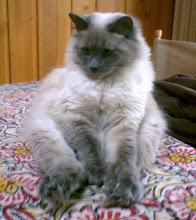
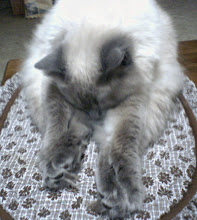.jpg)

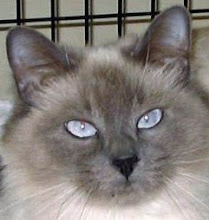

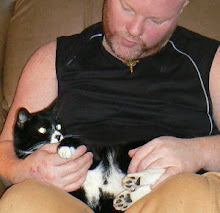
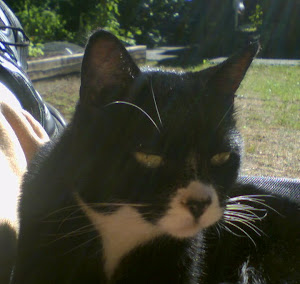
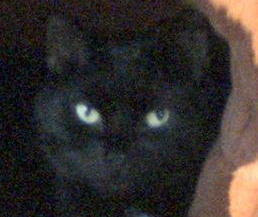.jpg)
